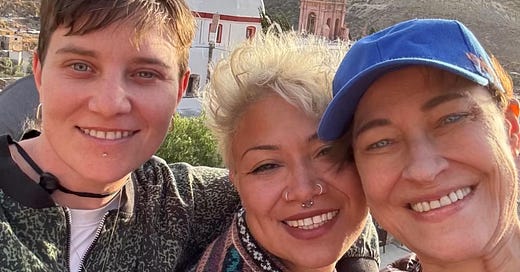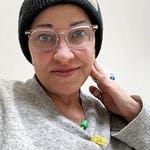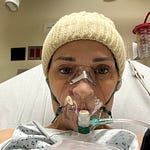If you read the first part of this journey here, you’ll remember it began in the desert. What follows is where it led me next.
We had just passed through the tunnel into Real de Catorce—narrow, dark, womb-like. Carved by pickaxe into the mountain, it didn’t feel like entering a town. It felt like crossing a threshold—into another way of being.
I came for a wedding. I left with blisters on my hands, dust on my boots, and something sacred stitched into the seams of my being. What unfolded wasn’t just ceremony—it felt like a lived answer to the question: how do we keep walking—tender, steady—in a world that’s burning?
It was a pilgrimage of fire, prayer, and community—the kind of belonging that carries you when your own strength runs thin.
The Fire That Held Us
The weekend began in the desert, under stars so sharp they felt close enough to touch. A great fire pulsed at the center of the circle. The Wixárika ceremony unfolded in waves—a river of song, prayer, silence, fire and smoke that pulled us inward.
I had pitched a tent, assuming I’d rest—but the night had other plans. We stayed with the fire, drawn into a current of presence, tethered by something older than memory. The same forces that had guided the Wixárika through nights like this for generations held us, too.
Some around the fire were old friends. Others, strangers only hours before. But all of us had arrived through the open door of love—woven into the lives of the two women who were marrying, and now woven into something more..
By dawn, we were no longer separate. The night had its way with us. Offerings had passed hand to hand and into the fire. Prayers had been whispered into the open dark. Songs rose and fell like waves—some ancient, some improvised. The mara'akame moved among us, his chants carrying our intentions skyward. With feather wands, he performed limpias—ritual cleansings—drawing out what no longer served us and restoring balance.
In one striking moment, he crystallized illness into form. The mara'akame leaned close and drew a deep breath from my chest, as if pulling the sickness straigh from my body. From his mouth emerged a small crystal—opaque, glinting, unmistakably real. Mine was black. In their tradition, that color signifies a long-held sickness. As he moved from person to person, he placed each crystal into a small cloth pouch near the fire.
Then, suddenly—one of the coyote-dogs lunged for the bag and made a run for it. My friend took off after him and caught it just in time. The mara'akame shook his head and said, thank goodness—you saved that dog. He would’ve gotten very sick.
Before we knew it, first light was cresting the mountains—fierce and tender all at once. We stood there in the desert—some barefoot, all altered—now watching the sky catch fire. The ceremony had done its work. Not ended, exactly. Light rose, not to break the spell, but to fold it gently back into the earth that had held us.
We crammed back into our white van, too small for our bodies but just big enough for all that we carried, and began the slow return to the city. Legs cramped, eyes heavy, hearts still echoing with songs and stars. We were exhausted, but held—as if the earth had pulled us close just as the sky opened above. The silence between us wasn’t tired. It was full. Like embers. Like prayer.
Later that day, we drifted back to our rooms—bodies heavy, spirits still ringing with the night—grateful for some rest before the next passage called us forward.
The Mountain That Tests and Teaches
Early the next morning came the climb to Cerro Quemado—known to the Wixárika as Leunaxü, the Birthplace of the Sun. This wasn’t just a mountain, but a living altar, a spine in the sacred geography of their world. To ascend it was to enter into relationship—with the land, with spirit, with one’s own edge. A test not just of breath, but of trust. Of surrender.
I had originally planned to hike up with the others, but I wasn’t sure my healing lungs could handle it. The steep terrain and thin air felt like a risk to a body still mending from surgery. So I chose what seemed like the wiser path: to ride part of the way by horse.
I messaged Adrian, thinking he’d be relieved. “I’ll go by horse,” I told him. He wrote back: Just don’t fall off. Classic Adrian—equal parts worry, sarcasm, and tenderness, distilled into five words or less.
I’d been so relieved to find a workaround, I hadn’t thought through the risk.
But Adrian had. He knows how these things can go sideways.
Maybe he even sensed it. Or maybe he jinxed it.
Because not long after I mounted, it was clear: this wasn’t going to be an easy ride. The horse was wild—skittish on the loose stone, rearing without warning, tossing his head, and snorting sharp bursts of breath like a warning flare. He kept trying to bolt where the trail twisted into rock.
His panic rose through the saddle like a current, and a knot formed in my chest—pain for this trembling being beneath me. It felt like a betrayal to add my weight to a body already bearing so much.
Then fear took hold, whispering all the ways this could unravel. If I fell, help was far. The only way to a hospital was back the way we’d come—over crumbling stone, down steep cobbled roads, through that long, dark tunnel, and across many more miles of rough terrain.
I longed to slip from the saddle and finish on foot—to ease his breath, to unburden us both. But the others had left hours earlier, and my horse ride had run late. They were already waiting on the mountain.
The only choice was to stay with him—to whisper steadiness into his fear. We were in it together.
But to calm him, I first had to calm myself. I let go of the spiraling thoughts—no more mapping hospital routes. I slowed my breath. I pictured a thread between us—thin, luminous, unbreakable. Into it, I whispered peace and traced Reiki symbols. My mantra rose, quiet and steady, like a well-worn prayer returning to its rhythm.
And then it wasn’t just the two of us anymore.
I remembered: I wasn’t climbing this mountain alone. I was moving in the slipstream of something invisible but sure—
the love that had circled us around the fire.
The same love with which I had said yes to this journey—booked the flights, placed offerings in my bag, trusted the pull without knowing the shape of what lay ahead. The love I knew would meet me at the summit.
The love that had sent me off with five soft words: just don’t fall off.
And then, there was the mountain herself—
The fierce wind urging me forward.
The sun’s quiet gaze, steady and golden, like a hand on my shoulder.
The ancient stillness of the cacti, standing sentinel along the path.
Even the dust beneath our feet seemed to whisper: keep going.
I hadn’t come all this way to hesitate at the edge.
We were climbing for each other.
And love had carried me this far—
it would carry me the rest of the way.
That trust steadied me more surely than the reins ever could.
Still, when it was finally time to dismount, I felt both relieved and grateful. Stepping onto solid ground was a quiet mercy.
I placed a hand on his neck, pressed my forehead to his mane, and whispered my thanks—not just for carrying me, but for staying, even when it was hard.
There was still one last stretch ahead.
The final climb—an almost vertical rock face—left the path behind. What remained was more suggestion than trail, winding over fractured volcanic stone and becoming a scramble; hands reached for balance as loose gravel shifted underfoot. I had to pause for breath every few steps, the thinning air slowing me down.
The ascent began to feel like something else—less a hike, more a quiet initiation. The sun now beat down on my back; my hat had long since flown with the wind. Near the summit, I came across the sacred spiral of stones honoring Tatewari, Grandfather Fire. But one final rise remained. With a last push, I reached the top. A friend pressed electrolytes into my hand and offered me a seat on the largest rock, directly across from the couple.
I was handed a purple ribbon tied around a large, decorated candle burning beside the couple. Purple—the color of motherhood. I hadn’t expected it. One of the brides had lost her mother, and I was standing in. As they handed it to me, I felt seen in a way I hadn’t expected. I hadn’t just shown up for the ceremony—I had shown up for the love that made it possible.
In that moment, I wasn’t just witnessing the ceremony.
I was part of it.
And I knew—I was exactly where I was meant to be.
At the end of the ceremony, the ribbon was wrapped around the candle, which the mara'akame explained was to be kept and lit whenever the couple faced a challenge.
The mara'akame cleansed each of us with feathers and copal smoke. He called on the spirits of the four directions, his voice rising in prayer and song, weaving petitions into the wind. Blessings flowed—for the couple, for the land, for the ancestors and all our relations. He prayed for harmony with the elements, for protection, and for the couple to meet each turning of life with tenderness and trust.
We lit candles. Offered coins, amulets, fragments of memory. Our prayers lifted with the smoke, carried into the vastness.
Before I knew it, the ceremony was over. I started down the mountain ahead of the group, afraid I might slow them down. Not far into the descent, I remembered something my friend had told me days earlier: that those living with illness often walk this mountain barefoot. It’s said to bring healing—to let the sickness pass through the soles of your feet and into the earth, where it can be transformed. She had gently urged me to try.
What It Means to Stay Soft
In the joy of carrying their prayers, I had forgotten my own.
But now, the moment had come.
I slipped off my shoes.
The stones were sharp; the earth, warm and alive.
Each step became a prayer—skin to stone, body to earth, humility to mystery.
I didn’t ask for a cure—though I’d welcome one, if it comes.
I asked for the strength to meet what’s ahead, and the steadiness to stay with it.
For resilience that doesn’t harden.
For softness that doesn’t shatter.
For the grace to keep moving—barefoot if needed—with a light step, even when the road is rough.
Especially in this time of collective collapse and confusion, I chose softness—not as retreat, but as a way through. To keep listening. Even to the sharpness underfoot.
May I keep walking—soft, steady, and awake.
Toward whatever is next.
And then, as the quiet settled in, another truth surfaced.
The Weave We Walk Together
In that stillness, I understood:
Caring for myself was not separate from caring for them. There is no dividing line.
We are not separate threads, stitched side by side.
We are one cloth.
When I tend to myself, I strengthen the weave.
There is no healing that belongs to me alone.
No burden I carry is mine in isolation—it is always held, in some way, by the circle.
We walk, we pray, we endure—for each other.
And woven through it all—through the ceremony, the climb, the prayers—I kept returning to the same truth:
We are carried by each other.
Not only through grand gestures, but through the quiet tether of presence. In whispered prayers. In shared weight.
Even now, in this season of terminal illness—when it would be easier to retreat, to close off, to conserve what little energy remains—life keeps placing new hands in mine: new bonds, new reasons to stay soft, new reasons to trust.
It’s not the easy things that bind us.
It’s the walking through what’s hard—together.
The carrying. The lifting. The enduring.
There is no path through these times that isn’t shared.
No healing that isn’t, at its core, communal.
I left Real de Catorce with blisters on my hands, dust on my boots, and something sacred stitched into my chest.
Not just strength. Not just trust.
But belonging.
And in a world unraveling—from war, injustice, and the machinery of disconnection—that belonging is no small thing.
It is resistance.
It is repair.
It is how we remember who we are—beyond borders, beyond fear, beyond the illusion of separation.
We walk for each other.
We rise for each other.
We love, still—for each other.
🧵 What strengthens your thread?
In a world where the powers that be profit from our disconnection—where systems are built to exhaust, isolate, and divide us—staying soft is not weakness. It’s resistance.
To care for ourselves and each other is how we stay in the fight.
How do you resource yourself?
How do you pour back into your community so we can keep rising—together?
Share a story, a ritual, or a quiet act that helps you remember:
You are part of the weave. We are stronger when threaded together.










Share this post